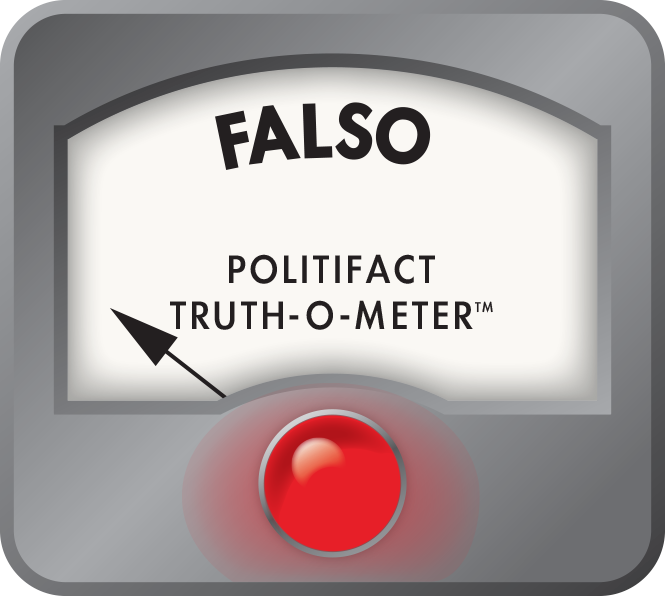Get PolitiFact in your inbox.
Yep. Reagan did the A-word
The GOP candidates keep sparring over who's tougher on immigration. In this climate, dem is fightin' words to say your opponent supports "sanctuary" or "amnesty" for illegal immigrants.
But as Giuliani reminded his foes during the Jan. 5, 2008, Republican debate, none other than Ronald Reagan, the patron saint of modern-day conservatism, signed the very law that Republicans call amnesty.
Say it ain't so!
Sorry. It's so. In 1986, Reagan signed an immigration reform bill, the first in 20 years, that legalized the status for 1.7-million people.
Some defenders of the law dispute the term "amnesty."
Sign up for PolitiFact texts
But here's how Edwin Meese, Reagan's former attorney general, characterizes what his boss did: "President Reagan called this what it was: amnesty. Indeed, look up the term 'amnesty' in Black's Law Dictionary, and you'll find it says, 'the 1986 Immigration Reform and Control Act provided amnesty for undocumented aliens already in the country.' "
Reagan signed the bill after Republicans and Democrats cobbled together an amnesty program in response to concerns from farmers worried about harvesting profits. The official record of congressional debates shows that lawmakers intended the program to provide a steady supply of labor for growers of perishable crops, such as cherries, grapes, peaches, etc. At the time the bill was written, however, "perishable" was defined so loosely that more durable crops such as potted plants, tobacco and seedlings were lumped in as well.
So even at the start, this program could be interpreted in ways that would benefit employers looking to save on wages.
To qualify for temporary status, migrants had to show they entered the United States before Jan. 1, 1982, and that they had continuously resided since then. They could get permanent residency within 18 months after that if they met certain requirements, such as learning English. The program took effect in 1987, also covering up to 350,000 people who had worked in U.S. agriculture at least 90 days in each of the preceding three years.
Featured Fact-check
Many have called the program a success because it awarded green cards to 2.7-million migrants, giving them the hope of entry to the American middle class.
In exchange for the amnesty, the new law was supposed to have beefed up border patrols and stiffened fines for both the migrant workers and employers in cases of violation. Alas, the law failed to stop illegal immigration, and many critics of the law say the government never thoroughly regulated employers who skirted the law's requirements.
This much is certain: If the law aimed to curb illegal immigration, it failed: When the law was passed, there were about 5-million illegal immigrants; now, there's an estimated 12-million.
When Reagan signed the law, many predicted it would encourage the hiring of more migrants, especially outside of agriculture, and that this would spur the backlash against immigration that we're seeing today.
Giuliani, it would seem, brought up Reagan's legacy to show how difficult the immigration issue is. In doing so, he didn't trip any alarms on the Truth-O-Meter, which scores him a True.
Our Sources
Los Angeles Times, "'86 Amnesty Frames Immigration Debate," by Teresa Watanabe and Anna Gorman, June 3, 2006
New York Times, "An Amnesty by Any Other Name," by Edwin Meese III, May 24, 2006
New York Times, "Failed Amnesty Legislation of 1986 Haunts the Current Immigration Bills in Congress," by Rachel L. Swarns, May 23, 2006
New York Times, "U.S. Eases Rules on Illegal Aliens who Seek Amnesty," by Robert Pear, Oct. 9, 1987
New York Times, "U.S. Issues Rules Making it Easier for Aliens to Obtain Legal Status," by Robert Pear, May 1, 1987
New York Times, "U.S. is Expanding Amnesty Program for Illegal Aliens," by Robert Pear, April 6, 1987
Washington Post, "Aliens Laws to Change Nation, Experts Say; Immigrants Gaining Legal Status Likely to Compete for Better-Paying, More Desirable Jobs," by Mary Thornton, Nov. 28, 1986
New York Times, "What Alien Law Will Mean: Some Questions and Answers," by Robert Pear, Oct. 26, 1986
Washington Post, "President Endorses Immigration Proposal," by Mary Thornton, Oct. 17, 1986
Browse the Truth-O-Meter
More by Michael Van Sickler
Yep. Reagan did the A-word
Support independent fact-checking.
Become a member!
In a world of wild talk and fake news, help us stand up for the facts.

















































